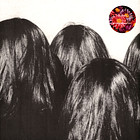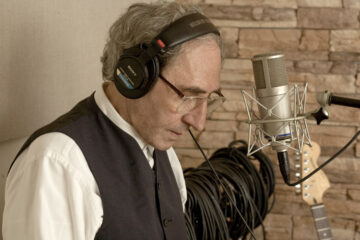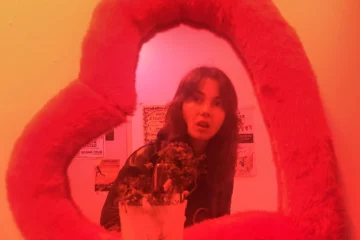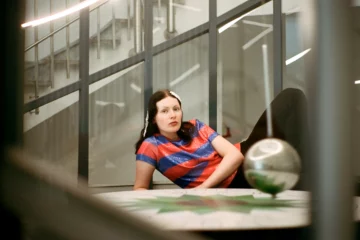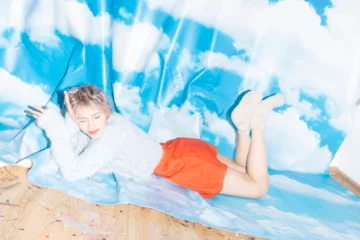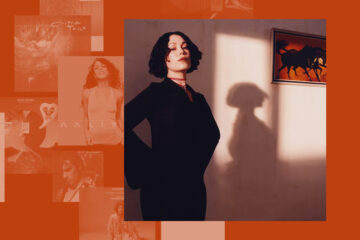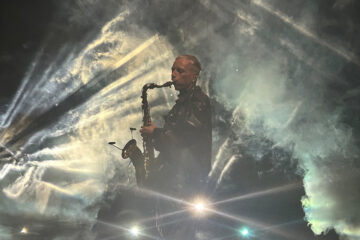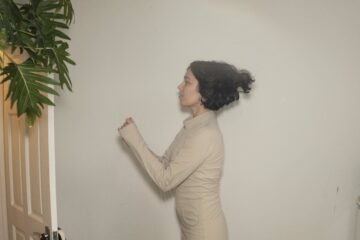On a weekday at 11 a.m. a zoom window opens, Håvard Volden greets me friendly in front of an unplastered wall with a plant. »Now, where is Jenny?«, he voices my thoughts, and then explains: Jenny Hval is in her studio in downtown Oslo, he is at home looking after their dog. Immediately afterwards, his partner in life and work also joins in, Lost Girls are ready for the interview.
With »Selvutsletter«, the Norwegian duo has just released its second studio album on Smalltown Supersound, on which the tangled openness of the predecessor has only been limited by the fact that this time no track breaks the 10-minute barrier. Between microtonal synths and casual grunge riffs, Hval’s lyrical reflectiveness emerges at once catchier and more multifaceted: here subtle darkness refers to her goth past or another callousness, there an unprocessed breaking of the voice or organ tones like light beams provide approachability.
»Selvutsletter« is an album full of music that perceives movement, that can conjure, that sounds like an aerodynamically predictable intermediate dimension. So it makes a lot of sense that Hval and Volden compose in a kind of Chinese whispers game at different places, between realities, so to speak. It will become clear during the interview that you don’t have to arm yourself for this, or if so, only with humor.
Jenny, you‘re also a writer. The German translation of your book »Girls against God« was just published this year. The protagonist reflects on her youth as a black metal fan and on starting a band at one point like this: »I have no more desire to represent myself. (…) I have no more desire to chase subjectivity, to search for something that is only me, without context, environments and background. (…) I want to participate in a chaos of collective energy. I want to be part of a band.« How much does that description apply to Lost Girls?
Jenny Hval: It‘s a description of something I find quite general. I probably approach my solo project like that as well because I never feel like it‘s so interesting to just feel alone in the universe and reflect on that. That‘s not the way I see art. Creating on your own is also, sometimes equally, feeling like you‘re part of something. But I do think that with Lost Girls, that‘s maybe one of the descriptions. You could use the word »lost« in our band name in a sense of getting lost in creating with others. Even if we‘re just a duo, it‘s definitely at the core of what this project is.
Another parallel to the book is that there is some sort of protest in your music as well. You don‘t seem to like conventional song structures or production methods. In the song »Drive« from 2018, you mime desperate crying in the vocals, which seems like a protest against always having to be strong. This kind of feminist anti-attitude is typical for your solo work. How important is that for Lost Girls?
Jenny Hval: I don‘t think it is less important for Lost Girls than for my solo project. I guess it‘s expressed differently because it‘s a collaboration. I think a lot about processing, the use of autotune or certain phrases in the radio friendly pop music. And lately I‘ve been watching a lot of Marvel films because we got Covid. Entertainment like this is exactly like pop music: it‘s all about super heros and super strong fighters. I think there‘s so much weaponry in pop music, and I think eveything I do, and definitely with Lost Girls, is trying to do something else with the human body and the human experience. Working with you, Håvard, has been very interesting in terms of protesting pop structure, but still managing to create something that to me is very catchy.
Håvard Volden: Normally I don‘t purposely try to ruin things or structures. It just happens, I guess. The way of how we compose is not trying to make this or that. It‘s just in a flow. And I guess that‘s a bit how you write lyrics as well?
JH: Yeah, I don‘t like to know what‘s happening. I don‘t like to decide how I write things or what things are about before I write. It would be like preparing for a job interview. But music is not a job interview.
HV: For most of the songs on this album, I sent some ideas or chords to Jenny and she totally made something else with it. For me that‘s very interesting, because it takes me to different places that I would never think of myself in a way.
JH: The same goes for you. The things you send me are usually stuff that I would never have thought of.
That sounds as if Lost Girls could only work as the duo of you two?
JH: We have done projects with other members and we‘ve involved people in other ways, but not necessarily in that process of one person sending a piece of music and then the other person restructuring it because it could easily be too many people in the kitchen. After that we keep developing in the same room also. But it‘s important to have space. Håvard, when you make a drum beat for example, I never understand them.
HV: I don‘t understand them either.
JH: But when I get them, I always think you understand them. And I don‘t understand what‘s going on. But then I put something else on top of it. I make another drum beat or I take a sample or something, and together it has this really interesting effect that I don‘t think we could do in a room together. So we need this kind of Chinese whispers situation to get started on ideas.
Maybe that’s why your music feels like in between space and time. It reminds me of the magic that a place of your past can have when you return to it later. But in order to sense this aura, you have to have a certain distance to what happened there. Do you have to create that kind of distance to things or places in order to get to such inter-worldly musical places?
JH: I probably see it from a different perspective. With this album in particular, I felt like I was flicking through some memories that I‘d almost forgotten, but that had this magic that you‘re talking about. As in films, when people have flashbacks and everything is glowing or has some kind of filter on it with hazy edges in the frame, to signalize we‘re in the past now. What I love about writing in general is that you don‘t have to stick to describing exactly what happened in 1996. It can be a poetic return to something that I may have experienced, or maybe just read about, but it has this magnetism for me. With some of the guitar lines that I was writing, I remembered some key moments in my youth: being online and the mysticism of not quite understanding what kind of communication I was having with other people on the internet. Playing in a band for the first time, the sound of Hollywood movies. All that ended up on the album.
HV: I probably didn‘t think of it that way, but I thought about the sound of certain things. With the song »On the other hand«, I was always hearing the sound of Leonard Cohen‘s guitar. Or other things like the organ sounds can take me to very specific places.
JH: I didn‘t know at that time that you thought of Leonard Cohen. But now, if I listen to one of the strumming songs of Leonard Cohen, it reminds me of how you play guitar in that song. Like if Leonard Cohen were to play in Sonic Youth in the 80s.
HV: It‘s funny because when I wrote the chords, I heard a male voice to it. But then I sent it to you, and you sent it back, and it wasn‘t Leonard Cohen anymore. So I was a bit disappointed and it took a while before I could get used to it.
»It‘s about being on stage and realizing that you‘re drawn to the people who don‘t understand you.«
Jenny Hval
The songtitle »Jeg slutter meg selv« means »I stop myself« and yet the song sounds least like a standstill. It‘s more like a boiling up dance track with a very catchy hook on its climax. But instead of repeating that melody, the song heads for its end after that. Is that what the title means, or does it refer to something else?
JH: This song is about being drawn to the wrong audience. In 2015, the two of us played as my project and it was our first support tour with St. Vincent. On the first night, we had the filmmaker Zia Anger with us and she ate a banana on stage. Some of the male fans started to yell from the audience, like: »Oooh, sexy!« Then she spat out the banana pieces and some girls shouted »Yeah!«. After that some of the fans were really confused. Later Zia said that she just had this line in her head: »I‘m sorry, I will change for you«, as a sarcastic way of approaching people who don‘t appreciate or understand what you‘re doing. It‘s a very absurd thing to say, but I love that line, and I think this song is actually about that. It‘s about being on stage and realizing that you‘re drawn to the people who don‘t understand you. There‘s always a part of you that wants to resist, but you also really want to engage with people who don‘t like you. Why is that? I don‘t have an answer, but that‘s definitely a part of the communication, and it‘s definitely a part of my motivation for performing.
Related reviews
In a talk with the Interview magazine on the occasion of your first release in 2018, you put together a soundtrack for your joint funeral. With that being done, how will you celebrate the release of your second album?
JH: I might take the dog for a long walk through the forest.
HV: The concerts we‘re doing in November will be the celebration.
JH: That could be our joint funeral.
HV: Yeah, maybe.
I don‘t hope so, but I was going to ask if this kind of black humor is a main part of your collaboration?
JH: Now I‘m just thinking about our costumes. Håvard is wearing his old suit from his confirmation. We found that suit of his protestant coming of age from 1995, and we decided that he should wear it on stage. I don‘t have that kind of clothing because I never grew up. So in our live performance there is a lot of humor. We also play quite humorously, a lot of the sounds we make are very silly and laughable.
HV: Also the set-up. We set up the tables more like an office, with the computers facing the audience, and us sitting next to each other.
JH: It‘s like the audience would be auditioning for us, or they‘re in a lobby and we‘re the double secretaries, the gatekeepers.
HV: When Jennys manager saw us, he wanted to buy us this old pencil-sharpener and a rolling index. Electronic musicians are always the table dudes. They always look like they‘re checking email, which they sometimes are. We wanted to flip that idea around.
»I think what‘s good about getting older as an artist is that self-effacing aspect about realizing that we are not really needed«.
Jenny Hval
The album title »Selvutsletter« is a word that you made up. You translate it as »self-effacing person« and describe it as someone who is »cleaning out themselves« . Does that describe a process of getting more lonely or more connected to other people?
HV: It‘s getting older and lonelier. We have a dog now, we have to take care of it. There‘s not much time for other people.
JH: I think what‘s good about getting older as an artist is that self-effacing aspect about realizing that we are not really needed. We do our thing, but we‘re not super important. What‘s important is everybody. It‘s a little bit like at the beginning of our conversation, when we talked about joining the band. Getting older is definitely getting more lonely because you‘re more busy. But it‘s also enjoying getting lost in the community, in the feeling that everyone does amazing work.



